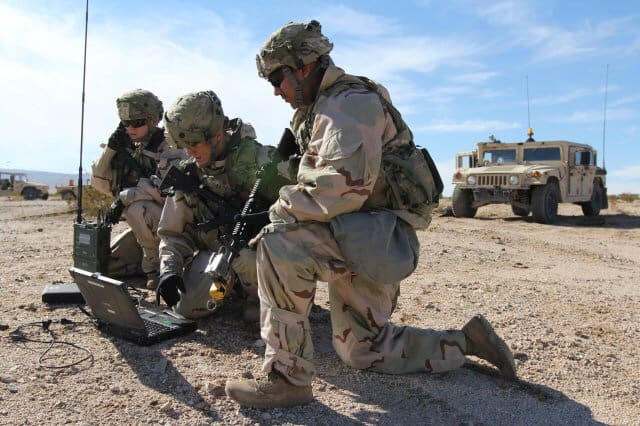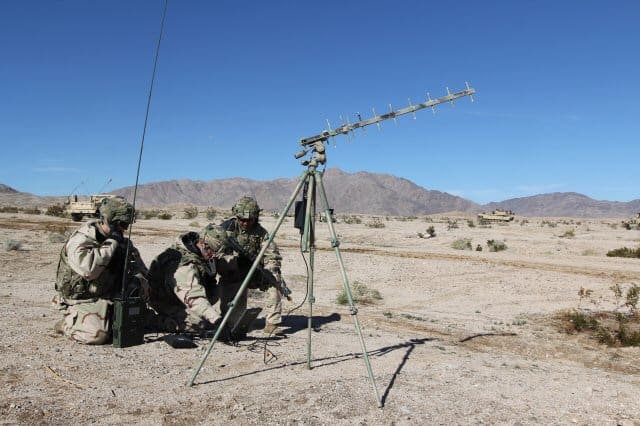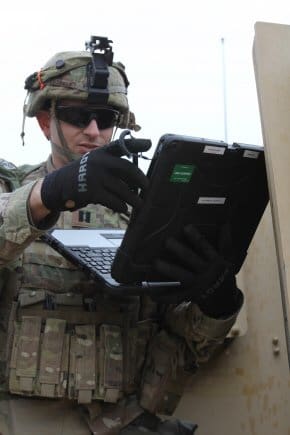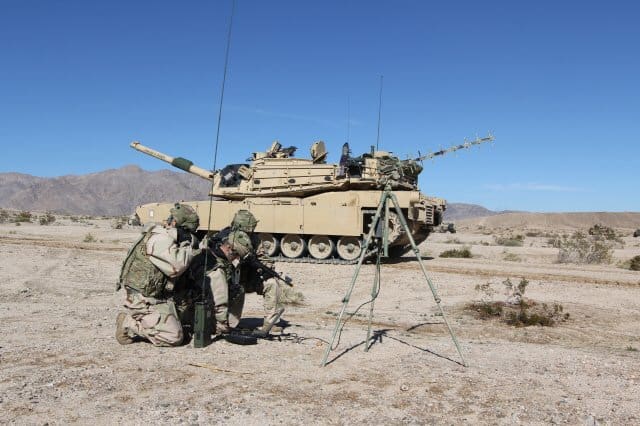FORT IRWIN, Calif. — Army cyber warriors often say one of the things they like about cyber as a career is that it offers the challenges and opportunities of engaging in cyberspace operations either at a desk or in a tactical environment.

Sgt. Alexander Lecea, Spc. Ashley Lethrud-Adams and Pfc. Kleeman Avery are Cyberspace Operations Specialists assigned to the Expeditionary Cyber Support Detachment (ECSD), 782nd Military Intelligence Battalion (Cyber) who were recently at the National Training Center, supporting a training rotation for a battalion from the 3rd Brigade Combat Team (BCT) of the 1st Cavalry Division.
All three say they chose an Army cyber career because of that mix — being able to move between working in an office and taking part in operations and exercises.
The detachment provides, “A little bit of both aspects of the cyber field,” Lecea said. “You get hands-on technical training — you can do this job in an office. But at the same time you can do it in the field. And there are real-world applications.”
While cyberspace operations can be done in an office, it’s not as effective as being on the ground with maneuver units, the sergeant said.
During training exercises such as this rotation in the southern California desert, the trio functioned alongside the cavalry battalion as an Expeditionary Cyber Team that provided cyber effects and intelligence for the rotational training brigade, Lecea said.

“We provide the maneuver commander with cyber effects and support the troops on the ground,” working in concert with the 3rd BCT’s Electronic Warfare officer and Cyber Electromagnetic Activities (CEMA) chief, Lecea explained, to achieve the brigade commander’s intent and guidance.
Lecea said he went became a cyber warrior because he, “wanted to do something that was challenging and rewarding and also have applications outside the Army. It’s one of the toughest [Military Occupational Specialties], but at the same time I feel that it’s the most rewarding. You have a lot of challenging situations and you have to use your brain. You have to have good teamwork, too.”
The sergeant said he isn’t sure if he will stay in uniform long-term, but added that the Army also offers training opportunities that will prepare him for the future, whether or not he reenlists.

“We’re talking about SEC+, NET+, a lot of industry standards certifications you’ll need outside in the civilian world to get hired. It’s all the stuff they look for,” he said.
“I was interested in the field and I didn’t just want to go to college, so I joined Army Cyber,” said Lethrud-Adams. “The Army is a great opportunity because you’re getting paid to learn all this stuff and you get experiences you wouldn’t get elsewhere in the world. You’re not going to get experiences like this in college.”
Lethrud-Adams said his favorite part of cyber operations is malware analysis, and his two teammates vehemently agreed.

Avery, the newest Soldier on the team, said he wants to become an ION (Interactive On-Net Operator) and eventually join the FBI.
Until then, he said, he enjoys the challenges of cyber operations and trying to figure things out.
Story and photos by Steven P. Stover, INSCOM.


Do they get mad if you call them keyboard commandos?
Call it like you see it.
“I was interested in the field and I didn’t just want to go to college, so I joined Army Cyber.” — It’s going to be a rude awakening for them when they ETS and start applying for jobs in the tech sector as most employers want you to have a 4 year college degree in STEM.
Fortunately they will be able to use their GI Bill to go get that STEM degree.
Or tuition assistance
I know plenty of people who work in the tech sector and do not have 4-year degrees. They got in with experience and/or certifications. A close friend of mine is an IT manager at a large energy company. No degree at all. Before my current career path, I worked for 8 years in software for a large tech firm you have heard of. My degree was a BA in nothing relevant or remotely technical.
No matter what your job in the military, if you can get a certification in your field on Uncle’s dime, go for it.
SGT Rock should stick to things he knows, like micromanaging soldiers dental appointments and leave things like the tech industry alone.
I haven’t seen a tech company, anywhere, really give a crap about your 4 year degree if you have the certifications and/or prove you can do the job.
We have software engineers without STEM degrees banking well over 6 figures a year.
A friend of mine didn’t like his current role at his company so he enrolled in a coding boot camp that lasted about 4 months. Came back to the same company as a software engineer making well into the 6 figures. No STEM degree.
Leaders speaking with authority about things they know little to nothing about probably has an adverse reaction on morale.
Not in cybersecurity. Clearance + experience is worth a great deal. I know plenty of folks working way over 6 figures. We’re a million people short in cybersecurity. Supply and demand in effect.